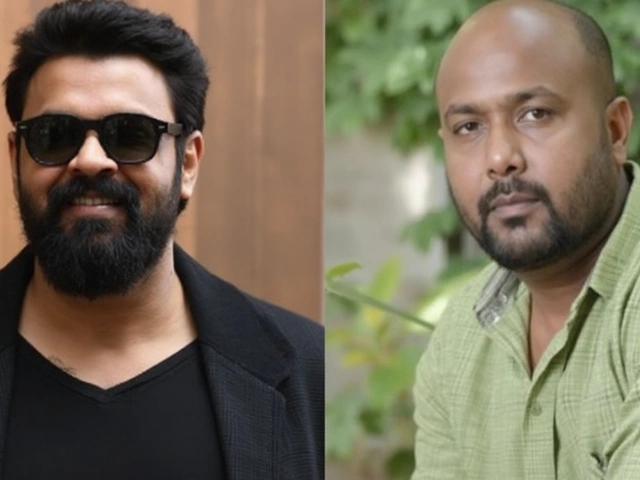Court Rejects Shadrack Sibiya’s Suspension Appeal Amid Tender Scandal

When Shadrack Sibiya, Deputy National Police Commissioner for Crime Detection of South African Police Service filed an urgent motion to overturn his removal, the Pretoria High Court threw the case out as moot on 9 September 2025. The ruling means the former deputy’s bid to reclaim his post is effectively dead‑ended, and the suspension that sparked the legal fight now sits squarely on the table of a pending disciplinary hearing.
Background to the Suspension
The saga began in March 2025 when SAPS placed Sibiya on leave amid whispers of misconduct. The situation escalated on 15 July 2025, when a formal "stay‑at‑home" order was issued, effectively barring him from his duties while an internal investigation proceeded. The order, announced in a terse internal memo, set the stage for a high‑profile showdown between the police hierarchy and a deputy commissioner who refused to step aside quietly.
During that period, the National Intervention Unit of SAPS raided Sibiya’s residence, seizing a laptop and "three or four" cellphones. Sibiya’s counsel, Ian Levitt, immediately dismissed the seizure as a "wild goose chase" and argued that the devices contained nothing incriminating.
Legal Challenge and Court Ruling
Determined to fight what he called an "unlawful" ban, Sibiya turned to the courts. He argued that the stay‑at‑home order violated his constitutional right to fair labour practices. Justice Zoleka Qodashe presided over the case. After a brief hearing, the bench concluded that the legal dispute had been overtaken by events: once SAPS formally confirmed the suspension, the earlier order was effectively nullified, rendering Sibiya’s claim moot.
"The applicant’s challenge is no longer justiciable because the institution has moved beyond the relief sought," the judgment read. The decision didn’t comment on the merits of the allegations, but it closed the door on Sibiya’s immediate hope of reinstatement.
Allegations and Tender Irregularities
The courtroom drama unfolded against a backdrop of explosive accusations from KwaZulu‑Natal Provincial Police Commissioner Lieutenant General Nhlanhla Mkhwanazi. In a televised briefing on 6 July 2025, Mkhwanazi alleged that a R360 million SAPS tender for security equipment had been awarded to alleged drug‑cartel figure Vusimuzi ‘Cat’ Matlala in 2024.
Mkhwanazi claimed that the tender was cancelled by National Police Commissioner Fannie Masemola on 13 May 2025 – just one day before Matlala was arrested for an alleged attempted murder. The commissioner also produced screenshots of WhatsApp chats allegedly linking Matlala’s financier, Brown Mogotsi, to Police Minister Senzo Mchunu. In those messages, Mogotsi is said to have urged Mchunu and Sibiya to "interfere and suppress" investigations.
The alleged communications also hinted at payments funneled to ANC political activities, suggesting a quid‑pro‑quo network where police officials might have turned a blind eye to criminal enterprises in exchange for political patronage.
Responses from Police Leadership
Commissioner Masemola swiftly labeled the claims as "unsubstantiated," but did not dismiss the need for a disciplinary process. "We will conduct a fair hearing while the deputy remains on suspension," she told reporters on 12 July 2025. The statement tried to balance the need for accountability with the principle of due process.
Minister Mchunu, speaking from his office in Johannesburg, denied any personal involvement, calling the accusations "politically motivated" and urging the public to let the investigative bodies do their work.
Meanwhile, Sibiya, flanked by Levitt, addressed a crowd of supporters outside his home in Pretoria in late September. "I will not resign. They must fire me," he declared, adding that the timing of the raid had traumatized his family.
Implications for SAPS and South African Politics
The court’s dismissal does not erase the cloud of suspicion surrounding the tender scandal. Analysts note that the case sits at the intersection of law enforcement integrity and ANC internal dynamics. If the alleged WhatsApp chats are verified, they could trigger a parliamentary inquiry into the misuse of police resources for political ends.
Furthermore, the episode underscores the frailty of SAPS’s internal governance. The rapid succession—from leave to stay‑at‑home order to formal suspension—has raised questions about procedural fairness and the influence of senior officials over disciplinary outcomes.
Looking Ahead
With the legal avenue closed, Sibiya now faces a disciplinary hearing that could result in dismissal, reinstatement, or a negotiated settlement. The hearing, scheduled for early 2026, will likely examine the tender documents, the seized electronic devices, and the contested WhatsApp messages.
For the broader police reform agenda, the case could become a catalyst for tighter oversight of procurement processes. Advocacy groups have already called for an independent audit of all SAPS tenders awarded since 2022.
Frequently Asked Questions
What were the main reasons behind Shadrack Sibiya’s suspension?
Sibiya was first placed on leave in March 2025 amid rumours of involvement in a R360 million tender irregularity. The situation escalated when a formal stay‑at‑home order was issued on 15 July 2025, citing potential conflicts of interest tied to alleged communications with Brown Mogotsi and possible interference in investigations into drug‑cartel figure Vusimuzi ‘Cat’ Matlala.
How does the court’s ruling affect the pending disciplinary hearing?
The dismissal on mootness grounds merely ends Sibiya’s attempt to reverse the suspension via the courts. It does not prevent the SAPS disciplinary panel from proceeding. The hearing will still assess the alleged tender misconduct, the seized electronic devices, and any proven links to political actors.
What evidence links Senzo Mchunu and Brown Mogotsi to the tender scandal?
Lieutenant General Nhlanhla Mkhwanazi presented screenshots of WhatsApp chats where Mogotsi discussed funneling money to Mchunu’s ANC activities and coordinating efforts to "suppress" investigations into Matlala. While the chats have not been independently verified, they form the crux of the allegations against both the minister and Sibiya.
Could this case trigger wider reforms of SAPS procurement?
Civil society groups and opposition MPs have already called for an independent audit of SAPS tenders awarded since 2022. If the disciplinary panel finds procedural breaches, it may prompt legislative amendments to tighten oversight, introduce third‑party reviews, and increase transparency in future contracts.
What impact might the outcome have on Police Minister Senzo Mchunu’s political standing?
Mchunu’s reputation is already under scrutiny due to the alleged link between his office and the tender scandal. A finding of misconduct could fuel calls for his removal within the ANC, especially if parliamentary committees deem the evidence credible. Conversely, a cleared outcome might bolster his claim of being a target of political sabotage.






King Dev
October 10, 2025 AT 04:00In the grand tapestry of South Africa's struggle with accountability, this case is a vivid thread that reminds us all-no matter where we hail from-that justice must be blind, not just a curtain for political puppeteers. The court's decision to deem Sibiya's appeal moot may close one legal door, but it also flings wide open the corridor for a disciplinary hearing that could expose deeper rot in procurement practices. As someone who bridges cultures, I see parallels in the way colonial legacies still whisper through modern institutions, urging us to demand transparency at every level. While the ruling may seem like a procedural victory for the SAPS hierarchy, the real battle lies in the public's insistence on a thorough audit of that R360 million tender. Let us not let this moment dissolve into bureaucratic noise; instead, use it as a rallying cry for systemic reform across continents.
Abhi Rana
October 22, 2025 AT 07:40Wow!!! This whole saga is like a Bollywood thriller with… lots of drama and maybe a dash of missing paperwrk!!! The court said “moot” but the real story is still out there, waiting for the disciplinary panel to spill the beans!!! I think the police should just hand over every document, even the coffee stains!!! Let’s hope the truth isn’t lost in the shuffle…
Manisha Jasman
November 3, 2025 AT 10:20Even in the darkest corners of corruption, there’s always a spark of hope 🌟-the fact that the judiciary is willing to close the loophole shows some integrity! If the disciplinary hearing is transparent, it could set a precedent that deters future tender shenanigans. We must keep our eyes on the process and support whistle‑blowers, because every little push matters 😊. Remember, systemic change starts with a single honest act, and South Africa has shown resilience before. Let’s stay optimistic and keep the conversation alive! 🙏
Samradh Hegde
November 15, 2025 AT 14:00India stands with any nation fighting corruption.
Shankar Pandey
November 27, 2025 AT 17:40What we are witnessing is not simply a bureaucratic dispute, but a moral crucible that tests the very soul of the institution. When officials barter public contracts for political favors, they betray the covenant of public service-a covenant that should be sacrosanct. The alleged WhatsApp chats, if authentic, are tantamount to a digital confession of complicity, and yet the powers that be attempt to sweep them under the rug of “political motivation.” This is a classic case of ethical erosion, where the guardians become the predators. It is incumbent upon every citizen to demand accountability, lest we normalize the erosion of law for personal enrichment. The court's dismissal on procedural grounds does not absolve the deeper sin of corruption that festers behind closed doors.
Pratap Chaudhary
December 9, 2025 AT 21:20While the headlines scream scandal, it's essential we keep a balanced view and allow the disciplinary panel to do its job without prejudice. The alleged irregularities deserve thorough investigation, but we should also avoid jumping to conclusions before the evidence is fully examined. A transparent process can rebuild public trust and perhaps even set a new standard for procurement oversight in SAPS. Let's encourage all parties to cooperate openly, because only through collective honesty can we heal this wound.
Shailendra Thakur
December 22, 2025 AT 01:00Honestly, the whole “political sabotage” narrative feels like an excuse for the elite to dodge responsibility-it's just classic power‑play.
kajal chawla
January 3, 2026 AT 04:40THIS IS EXACTLY WHAT THEY WANT YOU TO THINK!!! The tender was a front, the WhatsApp chats are just the tip of the iceberg!!! The real puppeteers are pulling strings from the shadows, feeding money to politicians while the public looks away!!! Wake up, people!!!
Smita Paul
January 15, 2026 AT 08:20I hear the frustration and fear that surrounds this case, and it's completely understandable. The possibility that high‑level officials may have leveraged public funds for private gain is alarming, and we all deserve clarity. The upcoming disciplinary hearing offers a chance for facts to surface, and I hope the panel approaches it with impartiality and diligence. In the meantime, let’s keep the dialogue respectful and focus on the evidence rather than speculation.
avinash pandey
January 27, 2026 AT 12:00The recent adjudication by the Pretoria High Court, while procedurally succinct, opens a Pandora’s box of systemic procurement failures within SAPS that warrants exhaustive scholarly scrutiny.
From a legal perspective, the mootness doctrine applied here underscores the judiciary's reluctance to intervene in executive disciplinary mechanisms, thereby preserving the separation of powers but simultaneously deferring substantive accountability.
Nevertheless, the suspension of Deputy Commissioner Sibiya is intrinsically linked to the R360 million tender controversy, a nexus where fiscal policy, criminological oversight, and political patronage intersect.
The alleged involvement of Vusimuzi “Cat” Matlala, a figure flagged for organized crime, raises red flags about the robustness of vetting protocols in public procurement cycles.
Moreover, the purported WhatsApp exchanges implicating Brown Mogotsi and Minister Senzo Mchunu constitute prima facie evidence of a clandestine quid‑pro‑quo arrangement, potentially contravening the Public Finance Management Act (PFMA).
If these digital artifacts are authenticated, they could serve as a catalyst for a parliamentary committee inquiry, invoking sections of the Constitution that safeguard against the misuse of state resources.
The disciplinary hearing slated for early 2026 thus becomes a crucible for testing the internal governance frameworks of SAPS, particularly the efficacy of its internal audit and oversight bodies.
From an organizational behavior standpoint, the rapid escalation-from leave to stay‑at‑home order to formal suspension-suggests a lack of procedural safeguards that protect employees' due process rights.
This procedural volatility may also reflect an underlying power struggle among senior officials, each seeking to consolidate influence amid a climate of political uncertainty.
In the broader context of South African public sector reform, the case exemplifies the perennial tension between technocratic efficiency and politicized patronage networks.
Civil society groups have already called for an independent forensic audit of all SAPS tenders since 2022, an initiative that aligns with international best practices on anti‑corruption transparency.
The audit could employ data‑analytics methodologies, such as network analysis of contract award patterns, to detect anomalies indicative of collusive behavior.
Simultaneously, the judiciary’s decision to dismiss the appeal on mootness grounds should not be misconstrued as an exoneration of the substantive allegations; rather, it delineates the jurisdictional limits of judicial review.
Consequently, the onus now squarely rests on the disciplinary panel, the Office of the Public Protector, and the media to illuminate the factual matrix surrounding the tender.
Only through a concerted, multi‑stakeholder effort can the specter of corruption be dispelled, restoring public confidence in the SAPS and reinforcing the rule of law.
Shruti Phanse
February 8, 2026 AT 15:40Thank you for the comprehensive analysis; your breakdown of the legal, procedural, and organizational dimensions provides valuable clarity. I concur that the disciplinary hearing is now the pivotal arena for factual determination, and that an independent audit could significantly enhance transparency. It is essential that all stakeholders-legal bodies, civil society, and the media-coordinate their efforts to ensure a thorough and impartial process. I hope the outcomes will set a precedent for stronger governance and reinforce public trust in law‑enforcement institutions.